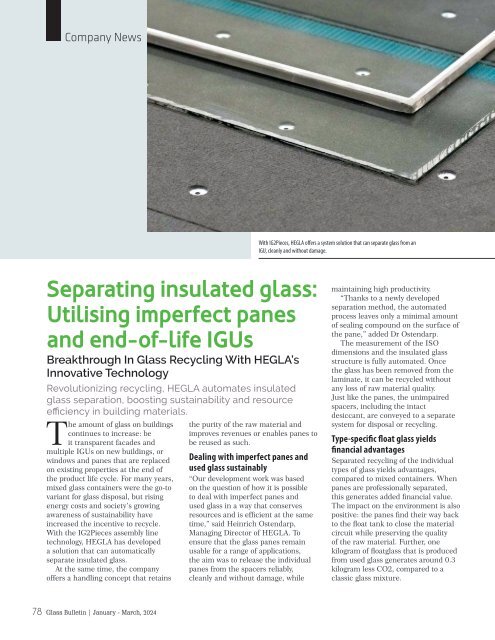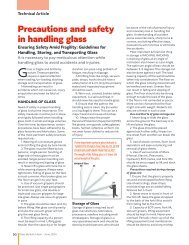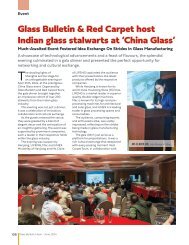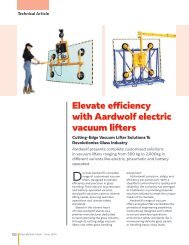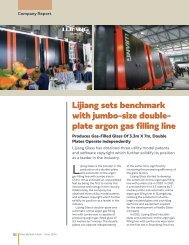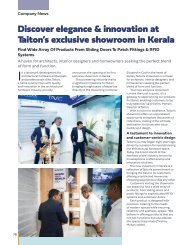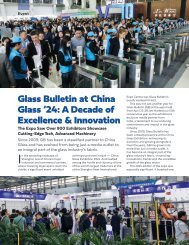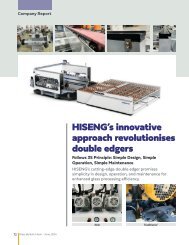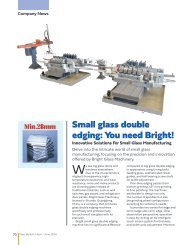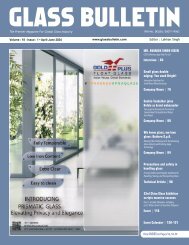Edition 73 (January-March, 2024)
GLASS BULLETIN is a publishing company, managed by a highly experienced editorial and administrative staff. It has a dedicated and responsible team for providing quality journals and related services to its readers. The company publishes GLASS BULLETIN which is the fastest growing top-notch journal of India for the global glass industry. It is published quarterly and circulated among glass manufacturers, glass processors, glass-machinery & tool manufacturers, art glass processors, glass dealers, architects, builders, aluminium fabricators, interior decorators and the automobile industry across the globe. GLASS BULLETIN is the ideal platform, both in the print and digital media, for worldwide exposition of news, reports, products and exhibitions related to the glass industry. It is a one-stop solution for all queries and needs related to glass–machinery and technology, its innovation, product-procession and marketing in India. By its permanent columns, it enjoys the status of highest readership among all Indian glass journals. GLASS BULLETIN is the media partner for international glass exhibitions in Beijing, Shanghai and Guangzhou in China besides in other parts of the world, including Europe, India and the Middle East. GLASS BULLETIN e-magazine, the first glass-related e-magazine of India, is also available online and on mobile phone, free of cost at http://www.glassbulletin.com
GLASS BULLETIN is a publishing company, managed by a highly experienced editorial and administrative staff. It has a dedicated and responsible team for providing quality journals and related services to its readers. The company publishes GLASS BULLETIN which is the fastest growing top-notch journal of India for the global glass industry. It is published quarterly and circulated among glass manufacturers, glass processors, glass-machinery & tool manufacturers, art glass processors, glass dealers, architects, builders, aluminium fabricators, interior decorators and the automobile industry across the globe.
GLASS BULLETIN is the ideal platform, both in the print and digital media, for worldwide exposition of news, reports, products and exhibitions related to the glass industry. It is a one-stop solution for all queries and needs related to glass–machinery and technology, its innovation, product-procession and marketing in India. By its permanent columns, it enjoys the status of highest readership among all Indian glass journals.
GLASS BULLETIN is the media partner for international glass exhibitions in Beijing, Shanghai and Guangzhou in China besides in other parts of the world, including Europe, India and the Middle East.
GLASS BULLETIN e-magazine, the first glass-related e-magazine of India, is also available online and on mobile phone, free of cost at http://www.glassbulletin.com
You also want an ePaper? Increase the reach of your titles
YUMPU automatically turns print PDFs into web optimized ePapers that Google loves.
Company News<br />
With IG2Pieces, HEGLA offers a system solution that can separate glass from an<br />
IGU, cleanly and without damage.<br />
Separating insulated glass:<br />
Utilising imperfect panes<br />
and end-of-life IGUs<br />
Breakthrough In Glass Recycling With HEGLA’s<br />
Innovative Technology<br />
Revolutionizing recycling, HEGLA automates insulated<br />
glass separation, boosting sustainability and resource<br />
efficiency in building materials.<br />
The amount of glass on buildings<br />
continues to increase: be<br />
it transparent facades and<br />
multiple IGUs on new buildings, or<br />
windows and panes that are replaced<br />
on existing properties at the end of<br />
the product life cycle. For many years,<br />
mixed glass containers were the go-to<br />
variant for glass disposal, but rising<br />
energy costs and society’s growing<br />
awareness of sustainability have<br />
increased the incentive to recycle.<br />
With the IG2Pieces assembly line<br />
technology, HEGLA has developed<br />
a solution that can automatically<br />
separate insulated glass.<br />
At the same time, the company<br />
offers a handling concept that retains<br />
the purity of the raw material and<br />
improves revenues or enables panes to<br />
be reused as such.<br />
Dealing with imperfect panes and<br />
used glass sustainably<br />
“Our development work was based<br />
on the question of how it is possible<br />
to deal with imperfect panes and<br />
used glass in a way that conserves<br />
resources and is efficient at the same<br />
time,” said Heinrich Ostendarp,<br />
Managing Director of HEGLA. To<br />
ensure that the glass panes remain<br />
usable for a range of applications,<br />
the aim was to release the individual<br />
panes from the spacers reliably,<br />
cleanly and without damage, while<br />
maintaining high productivity.<br />
“Thanks to a newly developed<br />
separation method, the automated<br />
process leaves only a minimal amount<br />
of sealing compound on the surface of<br />
the pane,” added Dr Ostendarp.<br />
The measurement of the ISO<br />
dimensions and the insulated glass<br />
structure is fully automated. Once<br />
the glass has been removed from the<br />
laminate, it can be recycled without<br />
any loss of raw material quality.<br />
Just like the panes, the unimpaired<br />
spacers, including the intact<br />
desiccant, are conveyed to a separate<br />
system for disposal or recycling.<br />
Type-specific float glass yields<br />
financial advantages<br />
Separated recycling of the individual<br />
types of glass yields advantages,<br />
compared to mixed containers. When<br />
panes are professionally separated,<br />
this generates added financial value.<br />
The impact on the environment is also<br />
positive: the panes find their way back<br />
to the float tank to close the material<br />
circuit while preserving the quality<br />
of the raw material. Further, one<br />
kilogram of floatglass that is produced<br />
from used glass generates around 0.3<br />
kilogram less CO2, compared to a<br />
classic glass mixture.<br />
78 Glass Bulletin | <strong>January</strong> - <strong>March</strong>, <strong>2024</strong>


